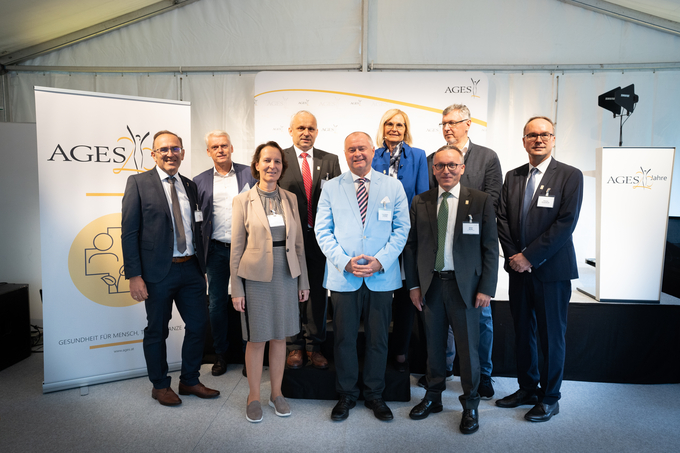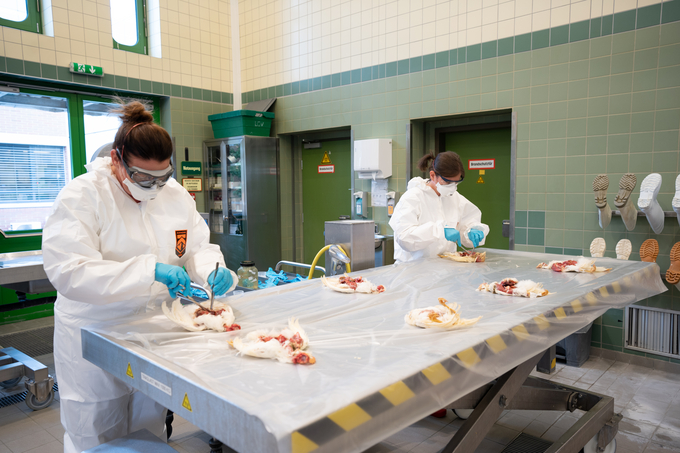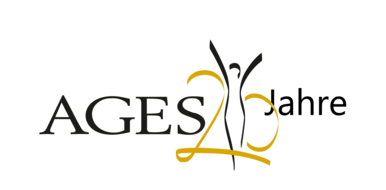The AGES Institute for Veterinary Investigations in Mödling is one of the most modern and important facilities for maintaining animal health and keeping our animals healthy in Austria," emphasized National Council Member Mayor Hans Stefan Hintner, who opened the "20 Years AGES Mödling" anniversary celebration on behalf of Governor Mikl-Leitner. "We are proud to have such an internationally recognized animal health facility in Lower Austria," emphasized Mödling's mayor. Around 150 guests from politics, authorities and companies as well as universities, research and social partners accepted the invitation to the "20 Years AGES Animal Health" celebration in Mödling and toured the veterinary facilities. Afterwards, Lower Austria's regional veterinary director Christine Riedl, animal production expert of the Austrian Chamber of Agriculture Adi Marksteiner, federal chairman of the food trade of the Austrian Chamber of Commerce Christian Prauchner and Bernhard Rupp, health expert of the Lower Austrian Chamber of Labor, discussed perspectives, opportunities and challenges in the 21st century and regional strategies to cope with them. ****
The technical focus at the AGES site in Mödling is on the diagnosis of animal pathogens as well as infections that can be transmitted from animals to humans (rabies, brucellosis, tuberculosis, BSE, etc.), but also diseases that can be transmitted by vectors (ticks, gnats, etc.) (West Nile virus, Schmallenberg virus, TBE, Usutu virus, etc.), which are increasing due to climate change and are therefore also in the investigation portfolio. "Compared to many European countries, Austria's animals have an excellent health status and therefore also officially recognized freedoms such as for bovine tuberculosis, bovine brucellosis, bovine herpes, bovine diarrhea, bluetongue, Aujeszky's disease or scrapie," says AGES Managing Director Thomas Kickinger. "Austria's status as 'free of' is important for an exporting country. The high health status of Austrian farms ensures the export of healthy animals and animal products and is thus a significant economic factor." In addition, "diseases transmissible from animals to humans and antibiotic resistance are major challenges for human, animal and environmental health," Kickinger stressed.
Twenty years ago, an animal disease alarmed the whole of Europe: the cattle disease BSE. Since then, around 2.6 million cattle have been examined in Austria as part of BSE monitoring by AGES. In eight cases, cattle tested positive. Since 2012, Austria has been classified as a country with a "negligible BSE risk" by the International Animal Health Organization (WOAH). The so-called mad cow disease can also be transmitted from animals to humans. "People's confidence in food was shaken. The lesson learned from the BSE crisis was improved European cooperation and the founding reason for the Austrian Agency for Health and Food Safety, AGES," Kickinger said. Today, according to the World Health Organization (WHO), the EU has "one of the best food safety systems in the world." This is also reflected in the AGES Risk Barometer surveys, he said. "Austrians have great confidence in their food. Almost three quarters are no longer worried about safety." Concerns about energy supply, epidemics and animal diseases have particularly increased.
"With state-of-the-art analytics and risk monitoring expertise, animal epidemics can be quickly contained," said AGES Managing Director Anton Reinl. He emphasized the "One Health" approach of AGES - i.e. the holistic view of risks to human, animal, plant and environmental health - as well as the cross-site and cross-business area cooperation, especially in laboratory analytics: "In the Corona pandemic, the benefits of AGES's foundation for crisis management became apparent. Laboratory specialists from veterinary and human medicine worked hand in hand to establish the methods and to support the health authorities with rapid and quality-assured laboratory results, even when the number of infections was rising." With regard to antibiotic consumption in veterinary medicine, Reinl referred to AGES's own vaccine production: "Stock-specific vaccines are a real alternative to the use of antibiotics for numerous animal diseases and the best precaution against resistance."
112-year history of veterinary medicine at AGES Mödling site
The "Free of..." status of notifiable animal diseases is the declared goal of all efforts of the 96 AGES experts in Mödling, where one can look back on 112 years of veterinary history. Founded in 1910 as the k.u.k. Animal Vaccine Production Institute and, since 1927, Federal Institute for Animal Disease Control, the AGES Center for Animal Health in Mödling today specializes in animal disease diagnostics, monitoring and research to keep animals healthy. For Institute Director Friedrich Schmoll, veterinary medicine in Mödling is today "an internationally recognized contact for questions of animal health and animal disease diagnostics at the most modern level of knowledge" with laboratory capacities and the veterinary expertise to monitor more than 30 notifiable animal diseases and other reference activities for infectious diseases. Mödling has a high-security laboratory for handling highly infectious animal diseases, state-of-the-art laboratory facilities (virology/serology/molecular biology), a veterinary vaccine production facility, as well as veterinary pathology examinations and a quarantine station for pets.
In addition to BSE surveillance, the veterinarian recalled the detection of the human pathogenic avian influenza virus H5N1 in wild animals in Austria in 2006, which led to great uncertainty among the population and to the establishment of the first AGES telephone infoline. However, with analytical and risk monitoring expertise, certainty was achieved that the avian influenza viruses had been detected in waterfowl but not in humans. Due to the 2007 outbreak of vector-borne (Gelsen) bluetongue in cattle, AGES launched close-meshed bluetongue surveillance. In 2011, after well over 200,000 tests in AGES laboratories in Mödling, the status "free of BTV" was achieved. Successful surveillance and control measures also led to a decline in rabies cases in the wild animal and pet sector. Austria has been recognized as "free of" rabies since 2008.
"Our goal is to maintain and further improve the status of animal health in Austria," Schmoll said. While the introduction of animal diseases such as avian influenza, brucellosis or IBR/IPV cannot be completely prevented, outbreaks can be successfully controlled through "close-meshed surveillance programs and established cooperation with veterinary and public health authorities." At AGES, infectious animal diseases, zoonoses and emerging animal diseases in Austria are detected and monitored at an early stage. "In this way, we help protect the domestic population from infectious diseases that can be transmitted from animals to humans, and thereby also make an important contribution to the safety of our food. Healthy animals also mean that Austrian food and agriculture remain competitive," Schmoll emphasized. For the AGES expert, the "key in the fight against zoonoses or antibiotic resistance" lies in the "One Health" approach, as previously emphasized by the AGES Executive Directors: "The health of humans, animals and the environment is indivisible."



